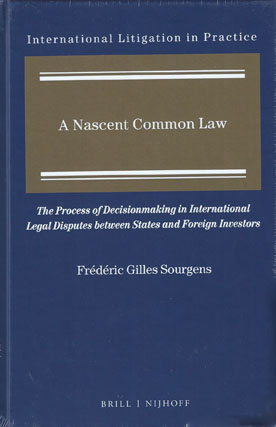
In A Nascent Common Law: The Process of Decisionmaking in International Legal Disputes Between States and Foreign Investors Frédéric Gilles Sourgens submits that investor-state dispute resolution relies upon an inductive, common law decisionmaking process, which reveals a necessary plurality of first principles within investor-state dispute resolution. Relying upon, amongst others, Wittgenstein's Philosophical Investigations, the book explains how this plurality of first principles does not devolve into arbitrary indeterminacy.
A Nascent Common Law provides an alternative account to current theoretical conceptions of investor-state arbitration. It explains that these theories cannot adequately resolve a key empirical challenge: tribunals frequently reach facially inconsistent results on similar questions of law. Sourgens makes an inductive approach, focused on the manner of decisionmaking by tribunals in the context of specific records that can explain this inconsistency.